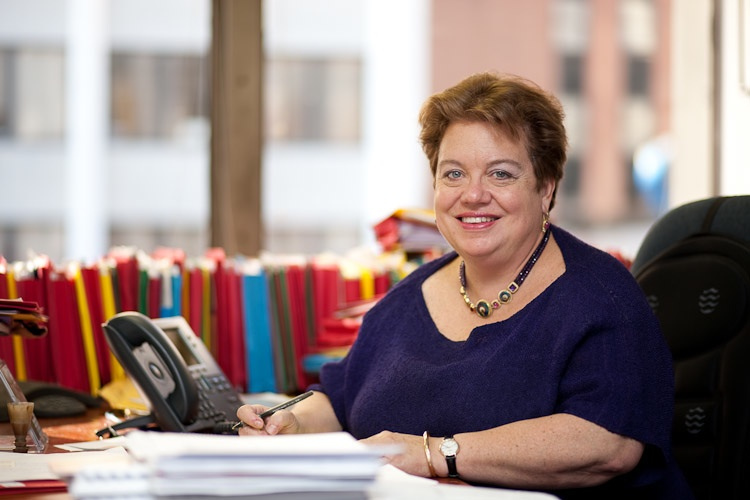The #MeToo movement has brought an unprecedented level of awareness about sexual harassment and assault into American society, but how will that awareness be translated into change? This was the question at the center of a panel discussion on the legal and political ramifications of the movement and its future held on Monday at Stanford Law School (SLS).
The panel, which was moderated by Legal Momentum CEO Carol Baldwin Moody, featured leading pollster and political strategist Celinda Lake; Director of the National Judicial Education Program to Promote Equality for Women and Men in the Courts Lynn Hecht Schafran; and SLS professor and Director of the Center on the Legal Profession Deborah Rhode.
Rhode began talking about the repercussions of the #MeToo movement with a quote from activist Gloria Steinem.
“Steinem said that the truth will set you free but will also piss you off,” Rhode told the audience. “The #MeToo movement is that first stage, in which you’re pissed off.”
Getting to the next stage, Rhode said, would include using the mainstream media’s interest in sexual harassment cases to hold harassers accountable.
“There is widespread recognition that sex sells, but now we know that so does sexual abuse,” she stated. She described social media as a forum that has enabled women to “bypass unresponsive legal processes and go straight to the public.”
Schafran agreed with Rhode that the movement has led to significant social progress, but emphasized that judicial bias remains. She pointed to a New Jersey case in which Judge James Troiano refused to try as an adult a 16-year-old who allegedly raped an intoxicated girl and said, “He is clearly a candidate for not just college but probably for a good college.”
Schafran also stressed that just appointing female judges was not a viable solution to this issue. As evidence, she cited a case in which a 16-year-old boy who allegedly raped a 12-year-old girl was not tried as an adult because Judge Marcia Silva, a woman, wrote, “the victim did not suffer any physical or emotional injuries other than the ramifications of losing her virginity, which the court does not find to be especially serious.”
Schafran called for legislative change that would prevent judges from ruling with this “bias,” including laws that require affirmative consent in sexual activity and the removal of the criterion in sexual assault policy that “resistance” occurs.
Moody also asked Lake about the political ramifications of the movement.
“We have seen a record number of women run for president and a record number of people of color run,” Lake said. “But we have also seen attrition, and it is disturbing that women are dropping out much faster than men and are having a hard time raising money and getting endorsements.”
Lake talked about the importance of attaining female support to sustain these campaigns and ultimately win elections.
“We have to win women by more than we lose men,” she added.
She also critiqued power structures within the American political system that block gender equity legislation with widespread public support, citing the Violence Against Women’s Act (VAWA) and Equal Rights Amendment (ERA) as examples of laws that face uphill battles in the political process yet are accepted by a majority of the public.
“The public is way ahead of our elite structures,” Lake told the audience. “We can’t get these things through our institutions, and then we wonder why our voters are discouraged and don’t want to vote.”
In offering a solution, Lake highlighted the importance of “beating Donald Trump” to put a President in office who would appoint fair judges and working toward systemic reform to support women in politics and create representative bodies.
Schafran, an author of the VAWA, said that the future of the movement should include a focus on violence.
“If you pay attention, what you see is that in the workplace and even in the home, this issue is so pervasive and it has such an impact on lives going forward,” she said.
Rhode concurred with Lake about the importance of political reform, saying that “more Americans need to make these issues a political priority and need to channel the outrage of the women’s march towards sustainable structural change.” She added that the focus of the movement should be first to help low-income women and women of color, whose issues often “fall through the cracks.”
“Those of us who have the leverage need to look to these more intersectional issues,” she told the audience.
Rhode concluded by encouraging the audience to be strategic in their advocacy. She explained that people often give her t-shirts and mugs that state “well-behaved women seldom make history,” and while she believes this to be true, she also feels that going through the right channels results in more change.
“We need to pick our battles, we need to fight on multiple fronts, and we need to write more checks, organize more potential voters and push legislators and judges in our directions,” Rhode said.
Contact Sarina Deb at sdeb7 ‘at’ stanford.edu.
